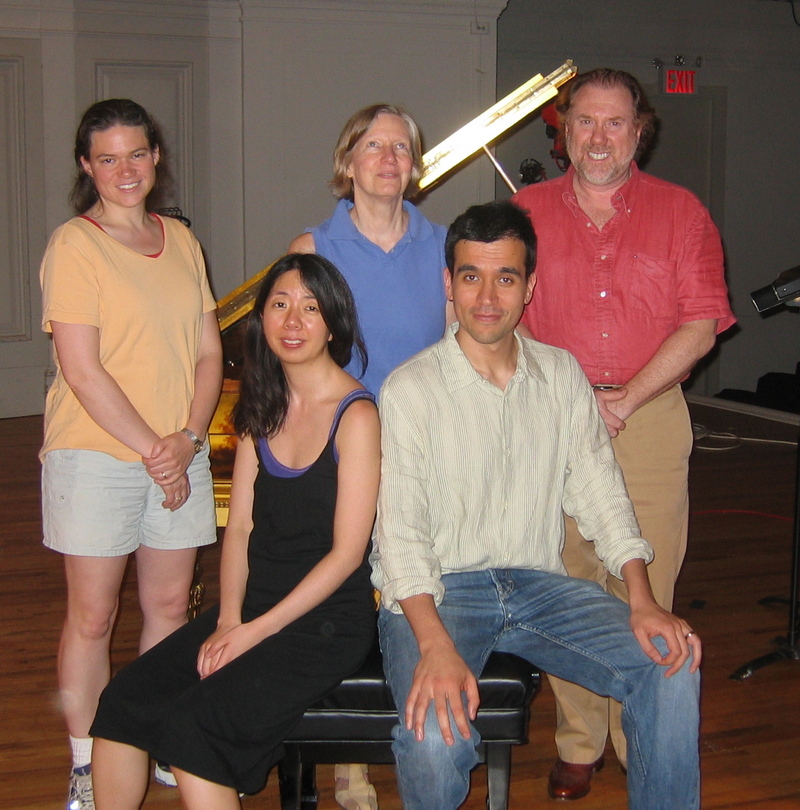For this CD, our debut recording, pianist Reiko Uchida and I chose some of our favorite Schubert songs from among the many dozens we'd been performing over the years and arranged them in an order that roughly suggests the arc of a day. The album begins with some morning songs about fishing and water, followed by a few songs celebrating the outdoors in the midday, and finally a set of nocturnal songs that starts out tragically but gradually gives way to a mood of celestial bliss.
We recorded in the summer of 2007 at the American Academy of Arts and Letters in Manhattan. Judith Sherman produced, with the assistance of Jeanne Velonis. Philip Calabrese was the technician for the Pleyel “Palatial” Grand Piano we used (courtesy of Klavierhaus). Ming-Fang Hsieh designed the CD package. Laura Rose took the cover photo. Download a PDF of my translations HERE.
For some reason, this CD is often very expensive to buy new from Amazon and other places. If you’re having trouble finding it at a normal price, email me (my last name at gmail dot com), and we’ll figure something out.
DIETRICH FISCHER-DIESKAU
Lovely singing. Let me tell you, that you gave me much pleasure on a healthy and beautiful sounding way to these difficult songs. Your accompanist is of the best qualities, strictly in the style called for in these songs. Your german is excellant so that I assume you are of German ancestors.
THE BANGKOK POST
This imaginatively programmed and performed selection of Schubert lieder is one of the most satisfying new vocal recital recordings to have come my way in months. Thomas Meglioranza is gifted with a voice of unusual warmth and richness, and on the evidence of what he offers here is well on his way to becoming a master interpreter of this repertoire.
On his website, Meglioranza explains that in creating the programme, he and his accompanist Reiko Uchida ‘‘picked a bunch of our favorite Schubert songs from among the many dozens [they have] been performing over the years and arranged them in an order that roughly suggests the arc of a day, starting with some early-morning songs about fishing and water, followed by a few songs celebrating the outdoors in the midday, and finally a set of nocturnal songs that begins tragically but gradually gives way to a mood of celestial bliss,’’ but there seems to be more to it than that.
Often, the songs chosen group into little cycles-within-a-cycle, with correspondences and reflectings allowing them to respond to or comment on each other. The opening sequence of ‘‘water’’ songs, for example, begins with an exuberant Fischerlied that celebrates the rigours and dangers of the fisherman’s life, and then goes on in subsequent songs to link fishing with the sport and, in the setting of Goethe’s Am Flusse, pain of love. Later in the programme this group of songs about life and living is answered with a sequence in which death is contemplated by those who know a lot about it, i.e., gravediggers and revelling ghosts. By the time it concludes with the night songs, it has the cumulative feeling of a cycle.
Although there are a few interpretations here that elude me — Die Einsiedelei, for example, and the setting of Schiller’s Dithyrambe — in others Meglioranza is remarkable in his ability to express the shifting emotional currents of these songs. In that heartbreaker Der Wanderer an den Mond and in Sehnsucht, which follows it, the shift from the minor mode of the opening stanzas, expressions of loneliness, to a comforting major in the later ones is given added poignancy by the change in timbre that Meglioranza brings to his voice. Listen to how the intensity with which he sings the first stanza of Wanderer, especially to the concluding line, is calmed by the contemplation of the ‘‘endlessly expansive’’ sky at the conclusion.
Listen to the virility of the opening Fischerlied and the ‘‘child-like joy’’ evoked by spring in Das Lied im Gruenen, both splendidly sung here. Later the artist enters so fully into the gravedigger’s morbid despair of Totengraebers Heimwehe, draining all warmth and vibrato from his voice at the point where the digger stares with a ‘‘longing gaze’’ into the grave he wishes to lie in, that a song which could seem over the top in a less accomplished performance becomes truly chilling.



